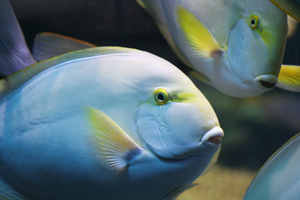|
||||||||||||||||||
Fish IntelligenceHumans are just beginning to understand fish intelligence and pleasure. Consideration of fishes' complexities is long overdue. In a section titled "Misunderstood Fish" of his book Second Nature: The Inner Lives of Animals, world-renowned animal behaviorist Dr. Jonathan Balcombe states: The common view that fishes are unfeeling robots with fins is becoming outdated in the face of emerging studies. Forty years ago, the idea of producing a book devoted to the mental and emotional qualities of fishes was unthinkable. Science wasn't ready to accept, let alone study, fishes in those contexts. Times have changed. … We have many prejudices about fish. … Fish didn't stop evolving when the first lobe-finned member of their kind ventured onto land and established the terrestrial vertebrate lineages. Fishes encompass a diversity of perceptual, mental, emotional, and cultural phenomena.i
Fish are more intelligent than they appear. In many areas, such as memory, their cognitive powers match or exceed those of "higher" vertebrates, including nonhuman primates.ii
[F]ish are regarded as steeped in social intelligence, pursuing Machiavellian strategies of manipulation, punishment and reconciliation, exhibiting stable cultural traditions, and co-operating to inspect predators and catch food.iii
[F]ish representatives recognize individual "shoal mates," acknowledge social prestige, track relationships, eavesdrop on others, use tools, build complex nests, and exhibit long-term memories.iv
Dr. Balcombe's Pleasurable Kingdom includes further, fascinating information on fish: Fishes are surely curious. They are known to cautiously investigate novel objects in their surroundings. Anyone who has had their legs nibbled at by schools of little fishes … has experienced their inquisitive nature. … Behavior consistent with some definitions of play – including manipulating and balancing objects, leaping, and chasing games – has been reported across disparate groups of fishes. There are many accounts of fishes leapfrogging, sometimes repeatedly, over floating objects, including turtles. Play-like jumping and leaping behavior is known from at least six different families of fish. Many readers will have witnessed one or more fishes repeatedly leaping clear of the water in a lake or pond.vi
To learn how you can help fish, click here. i Balcombe, Jonathan. 2010. Second Nature: the Inner Lives of Animals. Palgrave Macmillan: New York.
| ||||||||||||||||||
 University of Macquarie Biologist Dr. Culum Brown, an expert in the evolution of fish cognition, behavior and ecology, concludes:
University of Macquarie Biologist Dr. Culum Brown, an expert in the evolution of fish cognition, behavior and ecology, concludes: